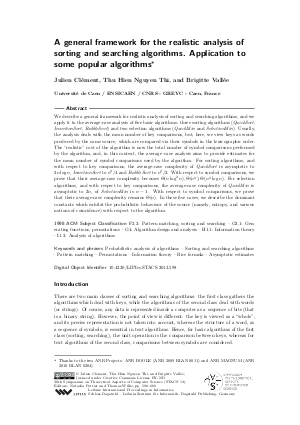A general framework for the realistic analysis of sorting and searching algorithms. Application to some popular algorithms
Authors Julien Clément, Thu Hien Nguyen Thi, Brigitte Vallée
-
Part of:
Volume:
30th International Symposium on Theoretical Aspects of Computer Science (STACS 2013)
Part of: Series: Leibniz International Proceedings in Informatics (LIPIcs)
Part of: Conference: Symposium on Theoretical Aspects of Computer Science (STACS) - License:
 Creative Commons Attribution-NoDerivs 3.0 Unported license
Creative Commons Attribution-NoDerivs 3.0 Unported license
- Publication Date: 2013-02-26
File

PDF
LIPIcs.STACS.2013.598.pdf
- Filesize: 0.61 MB
- 12 pages
Document Identifiers
Subject Classification
Keywords
- Probabilistic analysis of algorithms
- Sorting and searching algorithms
- Pattern matching
- Permutations
- Information theory
- Rice formula
- Asymptotic e
Metrics
- Access Statistics
-
Total Accesses (updated on a weekly basis)
0PDF Downloads0Metadata Views
Abstract
We describe a general framework for realistic analysis of sorting and searching algorithms, and we apply it to the average-case analysis of five basic algorithms: three sorting algorithms (QuickSort, InsertionSort, BubbleSort) and two selection algorithms (QuickMin and SelectionMin). Usually, the analysis deals with the mean number of key comparisons, but, here, we view keys as words produced by the same source, which are compared via their symbols in the lexicographic order. The "realistic" cost of the algorithm is now the total number of symbol comparisons performed by the algorithm, and, in this context, the average-case analysis aims to providee stimates for the mean number of symbol comparisons used by the algorithm. For sorting algorithms, and with respect to key comparisons, the average-case complexity of QuickSort is asymptotic to 2n log n, InsertionSort to n^2/4 and BubbleSort to n^2/2. With respect to symbol comparisons, we prove that their average-case complexity becomes Theta(n log^2n), Theta(n^2), Theta (n^2 log n). For selection algorithms, and with respect to key comparisons, the average-case complexity of QuickMin is asymptotic to 2n, of SelectionMin is n - 1. With respect to symbol comparisons, we prove that their average-case complexity remains Theta(n). In these five cases, we describe the dominant constants which exhibit the probabilistic behaviour of the source (namely, entropy, and various notions of coincidence) with respect to the algorithm.
Cite As Get BibTex
Julien Clément, Thu Hien Nguyen Thi, and Brigitte Vallée. A general framework for the realistic analysis of sorting and searching algorithms. Application to some popular algorithms. In 30th International Symposium on Theoretical Aspects of Computer Science (STACS 2013). Leibniz International Proceedings in Informatics (LIPIcs), Volume 20, pp. 598-609, Schloss Dagstuhl – Leibniz-Zentrum für Informatik (2013)
https://doi.org/10.4230/LIPIcs.STACS.2013.598
BibTex
@InProceedings{clement_et_al:LIPIcs.STACS.2013.598,
author = {Cl\'{e}ment, Julien and Nguyen Thi, Thu Hien and Vall\'{e}e, Brigitte},
title = {{A general framework for the realistic analysis of sorting and searching algorithms. Application to some popular algorithms}},
booktitle = {30th International Symposium on Theoretical Aspects of Computer Science (STACS 2013)},
pages = {598--609},
series = {Leibniz International Proceedings in Informatics (LIPIcs)},
ISBN = {978-3-939897-50-7},
ISSN = {1868-8969},
year = {2013},
volume = {20},
editor = {Portier, Natacha and Wilke, Thomas},
publisher = {Schloss Dagstuhl -- Leibniz-Zentrum f{\"u}r Informatik},
address = {Dagstuhl, Germany},
URL = {https://drops.dagstuhl.de/entities/document/10.4230/LIPIcs.STACS.2013.598},
URN = {urn:nbn:de:0030-drops-39681},
doi = {10.4230/LIPIcs.STACS.2013.598},
annote = {Keywords: Probabilistic analysis of algorithms, Sorting and searching algorithms, Pattern matching, Permutations, Information theory, Rice formula, Asymptotic e}
}
